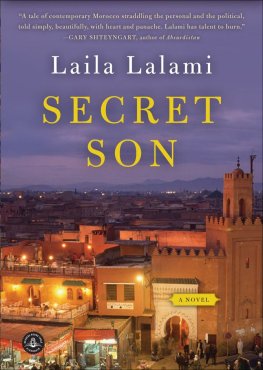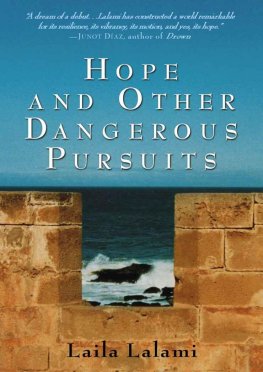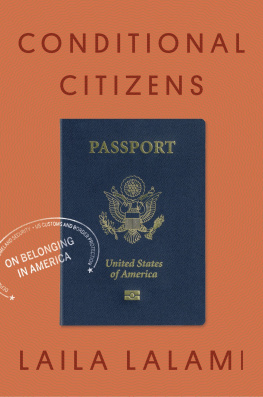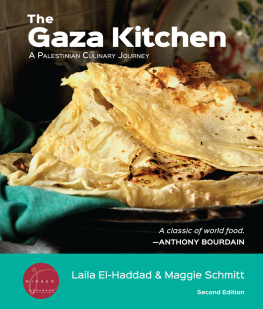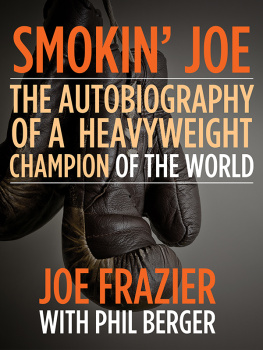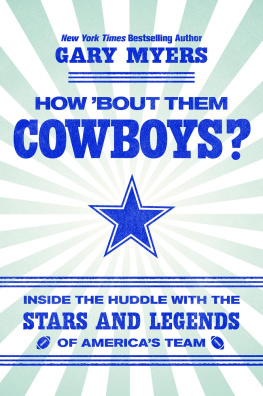Cindy Dyson - Laila Ali
Here you can read online Cindy Dyson - Laila Ali full text of the book (entire story) in english for free. Download pdf and epub, get meaning, cover and reviews about this ebook. year: 2014, publisher: Infobase Publishing, genre: Non-fiction. Description of the work, (preface) as well as reviews are available. Best literature library LitArk.com created for fans of good reading and offers a wide selection of genres:
Romance novel
Science fiction
Adventure
Detective
Science
History
Home and family
Prose
Art
Politics
Computer
Non-fiction
Religion
Business
Children
Humor
Choose a favorite category and find really read worthwhile books. Enjoy immersion in the world of imagination, feel the emotions of the characters or learn something new for yourself, make an fascinating discovery.
- Book:Laila Ali
- Author:
- Publisher:Infobase Publishing
- Genre:
- Year:2014
- Rating:5 / 5
- Favourites:Add to favourites
- Your mark:
- 100
- 1
- 2
- 3
- 4
- 5
Laila Ali: summary, description and annotation
We offer to read an annotation, description, summary or preface (depends on what the author of the book "Laila Ali" wrote himself). If you haven't found the necessary information about the book — write in the comments, we will try to find it.
Laila Ali is one of the pioneers of womens boxing. Her much publicized bout with Jacqui Frazier-Lyde, which was touted as a re-creation of the famous bout between the two w
Laila Ali — read online for free the complete book (whole text) full work
Below is the text of the book, divided by pages. System saving the place of the last page read, allows you to conveniently read the book "Laila Ali" online for free, without having to search again every time where you left off. Put a bookmark, and you can go to the page where you finished reading at any time.
Font size:
Interval:
Bookmark:
Copyright 2014 by Infobase Learning
All rights reserved. No part of this publication may be reproduced or utilized in any form or by any means, electronic or mechanical, including photocopying, recording, or by any information storage or retrieval systems, without permission in writing from the publisher. For more information, contact:
Chelsea House
An imprint of Infobase Learning
132 West 31st Street
New York NY 10001
ISBN 978-1-4381-4678-2
You can find Chelsea House on the World Wide Web
at http://www.infobaselearning.com
It was a Friday night, October 8, 1999, at the Turning Stone Casino in Verona, New York. The casino ballroom was sold out, filled to capacity with 2,800 boxing fans. Most of them had come to see the debut fight of one womanLaila Ali.
The match, situated among casino slot machines and game tables, looked like most fightssleaze and glamour side by side. The scene had all the ingredients of a major bout: the cigar-wielding promoter in the corner, the loud boxing commissioner, the muscled fighters, the pressing reporters, the eager fans, and the light-bathed ring.
Laila shrugged off her long, white, hooded robe and ducked under the ropes. Facing her was April Fowler, a 27-year-old waitress from Michigan City, Indiana. April had fought only once before. She'd been knocked out.
Laila weighed 166 pounds and stood 5-feet, 10-inches tall. She was lean and eager. Beside her April looked flabby and doomed. Laila shut out the cheering fans and her fears and focused on April and the fight ahead.
When the bell rang, April charged. She turned her head and clamped her eyes shut as her fists flailed at Laila. Laila backed her off with straight jabs, then a furious combination. Laila moved in for a left-right combination to April's jaw, knocking her back. April thudded to the canvas 31 seconds into the fight.
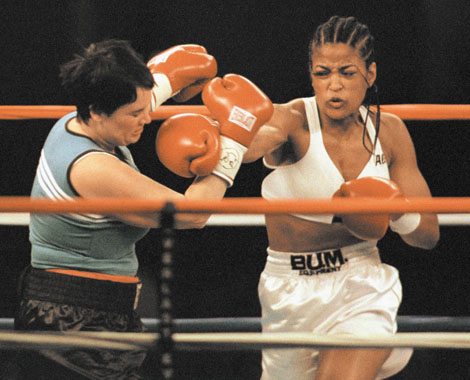
Laila Ali's pro boxing debut lasted only 31 seconds as she knocked out Indiana waitress April Fowler in the first round. Here, Laila's powerful right connects with Fowler's jaw. Fowler fell and didn't get up, ending the fight.
Source: Reuters NewMedia Inc./Corbis.
"Get up! Get up!" Laila screamed, standing over April with her fists cocked. But April stayed down, and Laila won her first professional fight in the first round with a knockout. When a fighter is knocked to the mat and doesn't get up within eight seconds, her loss is labeled a knockout.
Laila glanced down at her father, sitting ringside. She leaned through the ring ropes and kissed him on the cheek.
"My father said he was proud of me," Laila said later. "From the look in his eyes, I could tell he was proud of me."
Shortly before the fight, Laila's father had entered the ballroom as the ring announcer introduced "a man who needs no introduction," Muhammad Ali. The crowd craned their necks to watch Muhammad take his seat by the ring. A chant rose up, "Ali! Ali! Ali!"
As soon as Laila's fight ended, fans rushed forward toward Muhammad, pressing for autographs and handshakes. The ring announcer had to beg them to clear the aisles.
Laila knew most of the fans had come because of her father. She knew that if it weren't for his name, she'd be just another fledgling fighter. She knew that the reporterswho had come from as far away as Germany, England, and Japan, had come to see if she would live up to the standard her father had set decades before.
After the fight, reporters surrounded Laila. They commented on how much Laila's fighting style resembled her father's. Comparisons were inevitable, but Laila wanted to make sure people knew she intended to be a strong fighter in her own right.
"I wasn't trying to be like my father," Laila insisted. "I'm not my father. I'm me."
Laila's father, Muhammad, is the most well-known boxer in the world. He captured the world's attention in a way no other fighter ever has.
"He possessed all the attributes of a perfect hero: He was young, handsome, brash, witty, irreverent, chance-taking, religious, clean, and entertaining," wrote Ferdie Pacheco, Muhammad's fight doctor. "But, best of all, he was simply, far and away, the greatest fighter of his time."
Muhammad came to the world's attention in 1960 as Cassius Clay when he won the light-heavyweight division in the Olympic Games in Rome. Four years later, he announced he had converted to the Nation of Islama religion that had gained popularity with American blacks during the 1960s and 1970s. Cassius changed his name to Muhammad Ali. He would go on to become the heavyweight champion in 1964. He defended his title until 1967 when he refused to be drafted into the Vietnam War. He was stripped of his title, barred from boxing and sentenced to five years in jail. But Muhammad fought, filing an appeal and spending only one day in jail. By 1971, his appeal had reached the Supreme Court, which overturned his indictment unanimously.
In 1974, Muhammad reclaimed his title. In 1978 he fought challenger Leon Spinks and lost. But Muhammad fought Spinks again and regained the title of heavyweight champion of the world for an unprecedented third time in September 1978.
But it was more than his title that made Muhammad "The Greatest." His athleticism was legendary. He was a big man, but moved with the speed and precision of much lighter fighters. His calling-card slogan, "float like a butterfly, sting like a bee," described Muhammad's fighting style perfectly. He moved with grace and ease around the ring, seeming at times to play with his opponent. But his punches were devastating. He had successfully combined the lightweight fast footwork and easy dodges with the power of the heavyweight punch.
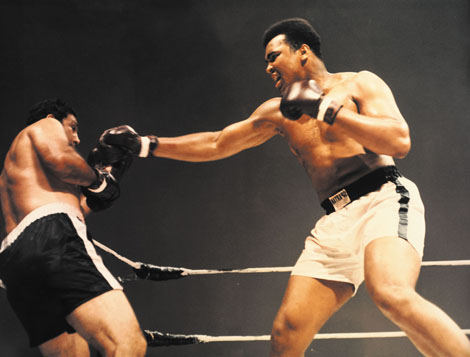
In his prime, Muhammad Ali was the fastest, hardest-hitting boxer in the ring, known for his slogan "Float like a butterfly, sting like a bee."
Source: Bettmann/Corbis.
He was also handsome. Watching Muhammad move, in the ring or out, captivated people. His body was famous for its beauty and grace. When he spoke, people were drawn to his handsome face.
Muhammad was known as a talker. He developed an arrogant way of speaking to the press that made boxing fans either hate or love him. At times he was playful, tossing subtle jokes and rhyming poems into his interviews. At other times he was intimidating, raising his fist at a reporter or glaring into a cameraall playful gestures tinged with something threatening. Muhammad bragged about his skills, predicting knockouts against his opponents, calling them too ugly to fight him. But he always backed up his bravado.
As early as 1977, Muhammad's health began deteriorating. A physical had shown signs of kidney and neurological damage. In 1980, Muhammad tried another comeback, and lost to Larry Holmes. By then many observers saw that Muhammad had lost speed, and that something was wrong.
Muhammad would be diagnosed with punch-drunk syndrome, a deterioration of the mid-brain, caused by repeated shocks. Later he would be diagnosed with Parkinson's disease, possibly brought on by repeated blows to the head. Parkinson's has slowed Muhammad's speech and movements. He suffers with tremors and will likely progress with less and less control of his movements, speech, and comprehension.
Laila was born after her father's boxing career had fizzled out, but she heard the stories. She listened to tales of Muhammad's brilliant 1964 defeat of heavyweight champion Sonny Liston, of Muhammad's conversion to Islam and his controversial opposition to the Vietnam War, and of his legendary fights against Joe Frazier, Ken Norton, and George Foreman.
Font size:
Interval:
Bookmark:
Similar books «Laila Ali»
Look at similar books to Laila Ali. We have selected literature similar in name and meaning in the hope of providing readers with more options to find new, interesting, not yet read works.
Discussion, reviews of the book Laila Ali and just readers' own opinions. Leave your comments, write what you think about the work, its meaning or the main characters. Specify what exactly you liked and what you didn't like, and why you think so.


